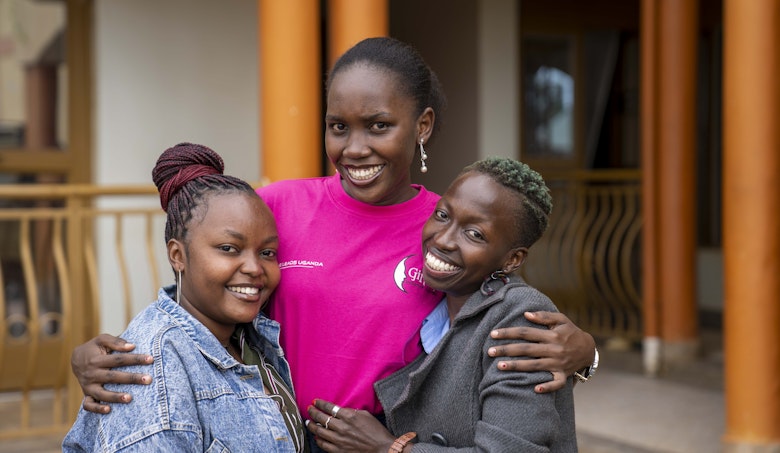The Power of Safe Spaces in Strengthening Girls and Young Women’s Potential
By establishing safe spaces, we have enabled Girls and Young women (GYW) to freely contribute towards decision making processes, share ideas, learn from each other and strengthen their advocacy movement. They have also been able to gain different skills, including skills in leadership, poetry and writing. Additionally, safe spaces have brought out the best out of the GYW, leveraged their innovativeness and strengthened their potential and a lot more that has positively impacted their lives.
A need for inclusive safe spaces
Girls and Young Women (GYW) need a space where they can congregate and freely share ideas, learn from each other and equally contribute towards decision making processes, which involve issues that directly affect them. For quite a long time, girls and young women in Uganda have not had any spaces to engage openly with each other. The disproportionate ratio of 1 girl representing 24 girls and young women, potentially exposed the representative to opportunities but made the rest of the girls feel excluded. The She Leads programme team therefore saw the need to develop a more inclusive approach that would give all GYW equal opportunities, hence plans to design physical safe spaces were set in motion.
Launching and designing safe spaces
The She Leads programme team launched the first safe space for girls and Young Women on 15th March 2022 in Ntinda- a Kampala suburb in Nakawa division, Uganda. The GYW took part in uniquely designing the safe space, which gave them a sense of belonging. Additionally, their approach to leadership was that which allowed each one of them to have the chance to lead as opposed to having a single leader serving them for a long time. A second space was opened on 21st March 2022 in Kawempe division and a third one was launched in Kampala Central on 24th May 2022. Two more spaces are to be opened in Makindye and Rubaga division as recommended by GYW. So far, 80 GYW (40 from Kawempe safe space, 15 from Central division and 25 from Nakawa safe space) are currently participating in the three established safe spaces.
GYW-led initiatives
The safe faces have enabled GYW to enhance their capacity through participation in various sessions where they got to learn about leadership, human rights, advocacy, feminism principles and the different life skills that help them to meaningfully engage and participate in any decision making platform that is availed to them. Moreover, at the centre of their discussions, GYW address three cross-cutting issues, which include child participation, gender mainstreaming and inclusion of children with disabilities.
To enhance inclusive child participation, GYW have created a TikTok (@shethoughts1) and Twitter (@loudvoices256) account where they showcase their engagement in decision making. Inclusion of girls and young women with disabilities is equally encouraged in every sitting and as a result, participants have started identifying peers that are differently abled to attend different project engagements. Besides, one of the most active members of the space lives with disability and she is given equal opportunity to participate with the other colleagues by sharing great ideas and contributing to discussions in the safe space. They have also actively participated in composing poems on various themes, published a story on the Daily Monitor Newspaper on mental health and gender and held a twitter space to discuss the elimination of harmful practices affecting children, on the day of the African Child.
Positive outcomes
The participatory approach that GYW use in their interactions, has made it possible for all participants to freely share feedback/concerns, knowledge, expertise/skills, contribute to discussions and write ups, and demand accountability from the representatives they send to different platforms. Safe spaces have as well brought out the best out of the GYW, leveraged their innovativeness and strengthened their potential as they continuously practise and mentor others —leading to enhanced mastery of their potential. Through the safe spaces, GYW have been empowered to identify the negative social norms and stereotypes that limit their meaningful participation in decision making. They seek to advance their collective voices in decision making spaces and hold duty bearers accountable.They also aim to enhance meaningful engagement and representation on all media platforms and foster gender sensitive reporting from the media houses.
Furthemore, safe spaces have been a centre for skills sharing amongst the GYW. Some of the skills include poetry, writing, guidance and counselling, bakery and cookery, leadership and public speaking. The Kawempe safe space, for example, has fostered a saving culture amongst GYW, and as a result, they are now practising urban farming growing vegetables mainly to sustain their safe space and boost their economic independence. Continuous mentorship sessions in the safe spaces have similarly helped GYW to objectively initiate conversations on ownership, development, leadership, bodily autonomy and justice. They have also developed confidence, especially when seeing their ideas and thoughts being implemented.
“A safe physical space for us GYW is an enjoyment and promotion of our right to expression,” said Fancy, the GYW mentor. Mary, the Current Nakawa safe space mobiliser also added, “I always long for our Friday sessions to freely share and learn.”
Empowered through safe spaces
Establishing physical safe spaces to strengthen GYW’s advocacy and activism, has been a great step in amplifying their voices. Letting and having GYW design, decide and run these safe spaces gave them a spirit of leadership and ownership.

